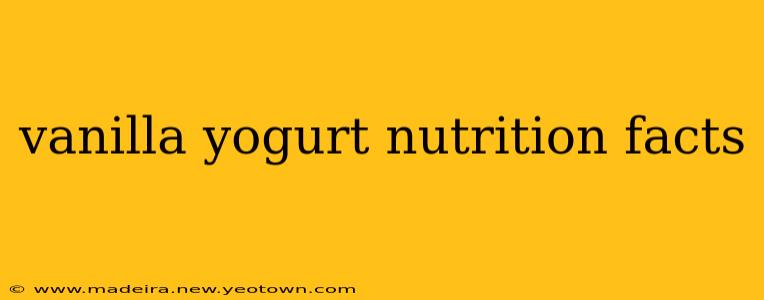Ah, vanilla yogurt. The creamy, subtly sweet treat that's a breakfast staple for many, a midday snack for others, and a surprisingly versatile ingredient in countless recipes. But beyond its delicious taste, lies a nutritional profile that deserves a closer look. This isn't just a dessert; it's a potential powerhouse of probiotics, protein, and calcium—depending on the brand and type, of course. Let's delve into the world of vanilla yogurt nutrition facts, exploring the benefits and considerations.
What are the nutritional benefits of vanilla yogurt?
Plain vanilla yogurt, particularly the low-fat or non-fat varieties, shines as a surprisingly nutritious food. It's often packed with protein, crucial for building and repairing tissues. This makes it a great choice for those looking to increase their protein intake, whether they're athletes, busy professionals, or simply aiming for a balanced diet. Furthermore, many yogurts are excellent sources of calcium, vital for strong bones and teeth. This is especially beneficial for growing children and adults aiming to prevent osteoporosis.
But the real nutritional star of the show in many yogurts is the live and active cultures, often referred to as probiotics. These beneficial bacteria contribute to a healthy gut microbiome, aiding digestion and potentially boosting immunity. A healthy gut is increasingly linked to overall well-being, impacting everything from mood to energy levels.
How many calories are in a serving of vanilla yogurt?
The calorie count in vanilla yogurt varies significantly depending on the brand, fat content, and added sugars. A typical serving (around 1 cup or 245g) of plain, non-fat vanilla yogurt might clock in around 100-150 calories. However, flavored yogurts, particularly those with added fruit or sweeteners, can easily double or even triple this number. Always check the nutrition label on the specific brand and flavor you are consuming. Be mindful of added sugars; some brands can be surprisingly high.
How much protein is in vanilla yogurt?
Protein content also varies between brands and types, but generally, a cup of plain, non-fat vanilla yogurt can provide around 10-15 grams of protein. This makes it a good option for a quick protein boost, especially when combined with other foods like granola or fruit. Greek yogurt, with its thicker consistency, is usually higher in protein than regular yogurt.
What are the potential downsides of eating vanilla yogurt?
While generally a healthy food, vanilla yogurt does have some potential downsides. As mentioned earlier, added sugars are a significant concern. Many commercially available flavored yogurts are loaded with sugar, potentially contributing to weight gain and other health problems. Therefore, opting for plain yogurt and sweetening it yourself with natural alternatives like fruit or a touch of honey is generally a healthier choice.
Secondly, lactose intolerance can be a problem for some people. Those with lactose intolerance may experience digestive discomfort after consuming dairy products, including yogurt. Fortunately, lactose-free yogurt options are readily available in most supermarkets.
Is vanilla yogurt good for weight loss?
Vanilla yogurt can be part of a weight-loss diet, particularly the low-fat, plain varieties. The protein content can help you feel fuller for longer, reducing overall calorie intake. However, it's essential to choose wisely, avoiding those with excessive added sugars. Overconsumption of even healthy foods can lead to weight gain, so moderation is key.
Is vanilla yogurt good for your gut?
Yes, vanilla yogurt can be beneficial for gut health, especially those containing live and active cultures (probiotics). These probiotics contribute to a balanced gut microbiome, improving digestion and potentially boosting immunity. Look for yogurt labels that explicitly state the presence of live and active cultures.
This exploration of vanilla yogurt nutrition facts hopefully clarifies its place in a healthy diet. Remember that the nutritional value varies considerably based on the specific brand and ingredients, so always read the nutrition label carefully before making your selection. Enjoy your yogurt responsibly!

